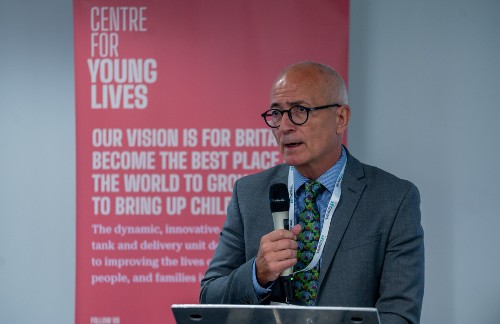The University of York's Vice-Chancellor joined colleagues from across the North of England to outline solutions for the millions of children in the UK who are growing up in poverty.
 Vice-Chancellor Professor Charlie Jeffery
Vice-Chancellor Professor Charlie Jeffery
The National Opportunity Summit saw policymakers, academics, clinicians and educators come together to address the issue and find a way forward.
Toolkits
The summit saw the launch of the 2025 Child of the North campaign, which will provide toolkits to schools, child health services and local authorities on the 12 topics identified by child health leaders as the major issues of concern.
York academics will lead on two topics as part of the campaign: mental health and wellbeing and vulnerability, crime and justice, with new reports and analysis due out in the coming weeks.
Delegates attending the summit in Leeds heard how almost half of school pupils currently on free school meals will have started their formal education without the necessary skills to thrive.
The new analysis by the Child of the North research group shows that 48.5% of children who receive free school meals will have started school without meeting 'school ready' criteria.
Meanwhile, 49.1% of children not school ready are later identified as having Special Educational Needs (SEN).
Children are deemed to be school ready if their performance is rated as age-appropriate in the domains of personal, social, and emotional development; communication and language; physical development; mathematics; and literacy.
Collaboration
The research lays bare the impact across a child's young life of being 'not ready' to start school – which puts them at much higher risk of issues such as poor dental health and being out of work or education in years to come.
The analysis uses the latest data from the 2023/2024 academic year to look at the long-term impact of being deemed not school ready.
The University of York's Vice-Chancellor Professor Charlie Jeffery attended the event and welcomed delegates on behalf of the N8 Research Partnership - a powerful collaboration, bringing together the eight most research-intensive universities in the North of England: Durham, Lancaster, Leeds, Liverpool, Manchester, Newcastle, Sheffield and York.
Child of the North is a joint project with the N8 Research Partnership and the Northern Health Sciences Alliance offering a research and policy-based programme fighting for a fairer future for children wherever they grow up.
Professor Jeffery said: "We have a once-in-a-generation opportunity to drive transformative change that aligns squarely with the Government's commitments to Opportunity and Growth.
"We have an opportunity to build on the best practices here in our region and beyond, to understand what truly works and to drive practical and affordable policy change both at national level and in our regions, working with local and mayoral authorities.
"By working together, and breaking down institutional and sectoral barriers, we can use the power of collaboration to create a better future not only for the young people of the North but nationally, tackling the scar of child poverty which limits opportunities and holds back life chances."
Opportunity
Professor Kate Pickett, Director for the Born in Bradford Centre for Social Change, attended the summit and led a session on "A country that works for all children and young people."
She said: "By turning our robust research into action, we can break the link between background and life chances. The summit signals a commitment to transformative, evidence-led policy that promises to expand opportunity for every child."
The summit supports the UK Government's Opportunity Mission - the goal of breaking down the link between a person's background and their future success, and giving children the best start in life.
These concerns were the focus of the 2024 Child of the North campaign, which saw reports on 12 key topics of concern produced by the N8 group of research-intensive universities in the North of England, in partnership with the Centre for Young Lives and Health Equity North.
The reports highlighted the problems of inequity by showing how children in the North of England face disadvantages in relation to a range of issues including poverty, special educational needs, school attendance and mental health.
Policymakers
The reports also provided evidence-based plans and recommendations to help policymakers address the issues.
Each report was based on in-depth research carried out by academic experts in children and young people's health and wellbeing from universities across the North of England and beyond, including Leeds, Manchester, Durham, York, Lancaster, Liverpool, Sheffield and Newcastle, as well as the University of Bradford.
The research made a series of policy recommendations which were adopted by the Department for Education's Scientific Advisory Council.
Josh MacAlister, Minister for Children and Families, said: "We've got an incredible moment of opportunity to break down barriers to opportunity at every stage, particularly for the most vulnerable children and we need to seize it and we can only do that with system leaders driving transformational disruptive change across the country to make that difference.
"I'm here to make sure that we do that and to work alongside all of you in that journey as well".






